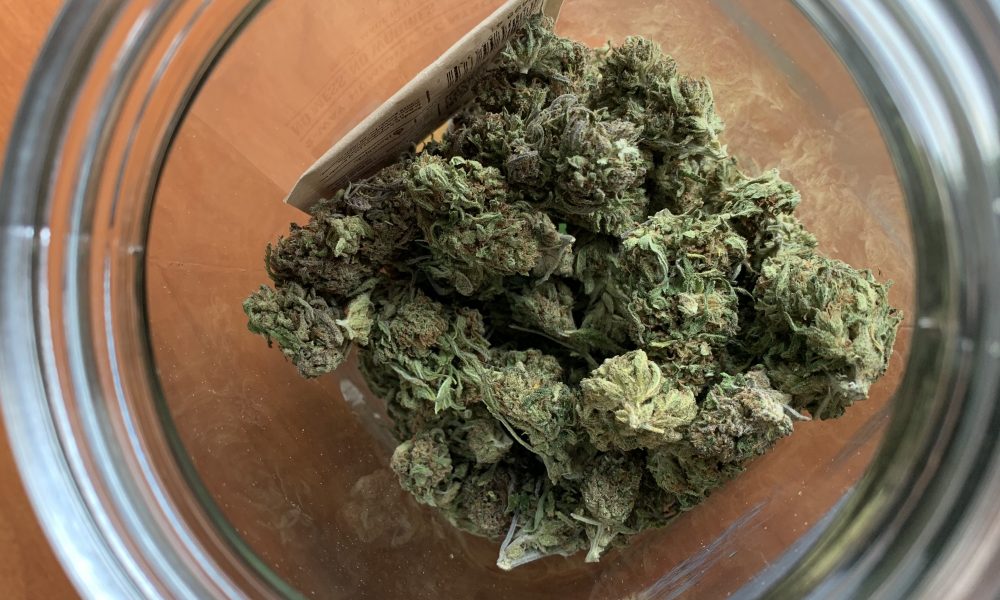Marijuana advocates have been waiting anxiously for this day: Senate Majority Leader Chuck Schumer (D-NY), Senate Finance Committee Chairman Ron Wyden (D-OR) and Sen. Cory Booker (D-NJ) have released their draft bill to federally legalize marijuana. But the issue has touched off a number of controversies, and White House support remains in question.
Beyond ending the decades-long prohibition on cannabis, the proposed legislation contains a litany of other provisions to promote social equity, facilitate research and repair the harms of criminalization. The three senators unveiled the 163-page bill at a press conference on Wednesday.
“This is monumental because, at long last, we are taking steps in the Senate to right the wrongs of the failed war on drugs,” Schumer said. “I was the first Democratic leader to come out for the legalization of marijuana, and I will use my clout as majority leader to make this a priority in the Senate.”
For decades, young people have been arrested and jailed for carrying even a small amount of marijuana.
It’s long past time for change.
I’m standing today with @RonWyden and @SenBooker to release our draft of the Cannabis Administration and Opportunity Act.
— Chuck Schumer (@SenSchumer) July 14, 2021
The legislation was not included as part of the $3.5 trillion budget reconciliation package that Senate Democrats agreed to earlier this week, with Schumer saying at the press conference that “we don’t have the votes necessary at this point” to pass cannabis legalization even with a reduced 50-vote threshold under the fiscal maneuver.
“This is going to be a process,” the majority leader said. “This is a draft bill. We intend to show it to all of the stakeholders.”
In the meantime, Schumer said that the White House “knows we are introducing this legislation, and we intend to show them the draft legislation and ask them to support it.”
Booker said at the briefing that the country is “in the midst of a grievous moment of injustice, and it is deep at the core of who we say we are: Equal justice under law.”
“We have waited too long we’ve seen the disaster of prohibition once before in this nation,” he said. “This is hurting every American.”
Joining @SenSchumer & @RonWyden to announce our legislative draft that will:
✅ Legalize marijuana
✅ Expunge marijuana arrest records
✅ Reinvest in communities most harmed by the drug war
It’s past time we take steps to fix decades of failed drug policy. https://t.co/SyrwUy9Liq— Sen. Cory Booker (@SenBooker) July 14, 2021
The senator, who previously sponsored a separate legalization bill titled the Marijuana Justice Act, also responded forcefully to a reporter’s question about whether cannabis banking reform could be pursued before a comprehensive proposal like the one they unveiled on Wednesday.
Booker said he “will lay myself down” to block any other senators who seek to pass marijuana banking legislation, arguing that it would only accomplish further enriching of people in a multi-billion industry without addressing the harms of the drug war.
Wyden, for his part, said on Wednesday that, “for the life of me, I don’t understand how Republicans who say they’re for states’ rights won’t support what my colleagues are talking about because what this bill does is we decriminalize federal level, but we don’t require states to legalize.”
Watch the conversation about the Cannabis Administration and Opportunity Act in the video below:
The main features of the legislation largely align with what advocates and stakeholders expected. It would federally deschedule cannabis, expunge prior convictions, allow people to petition for resentencing, maintain the authority of states to set their own marijuana policies and remove collateral consequences like immigration-related penalties for people who’ve been criminalized over the plant.ma
The bill would also impose a federal tax on marijuana products and put some of that revenue toward grant programs meant to support people from communities most impacted by prohibition who want to participate in the industry.
Further, the legislation would transfer regulatory authority over cannabis from the Drug Enforcement Administration (DEA) to the Food and Drug Administration (FDA), the Bureau of Alcohol, Tobacco, Firearms and Explosives (ATF) and the Alcohol and Tobacco Tax and Trade Bureau (TTB).
During an interview on NBC’s Today Show that aired on Wednesday morning, Schumer was asked whether he had the votes for passage. He responded: “We’re working on it.”
There’s a new push from Senate Democrats to legalize marijuana at the federal level. @gabegutierrez has the exclusive details. pic.twitter.com/zCSXNHrIgu
— TODAY (@TODAYshow) July 14, 2021
The majority leader also spoke on the Senate floor, stating that “Americans’ attitudes towards marijuana have undergone a dramatic transformation” in recent decades.
—
Marijuana Moment is already tracking more than 1,100 cannabis, psychedelics and drug policy bills in state legislatures and Congress this year. Patreon supporters pledging at least $25/month get access to our interactive maps, charts and hearing calendar so they don’t miss any developments.![]()
Learn more about our marijuana bill tracker and become a supporter on Patreon to get access.
—
“The states are supposed to be our laboratory for democracy and, by all accounts, these experiments have been a success,” he said. “The doom and gloom predictions of the naysayers—’oh crime will go way up, drug use will go way up’—have never, never materialized.”
Reaction to the bill
The legislation immediately drew mixed reactions from advocates, other lawmakers and the White House.
Minutes after the senators’ press conference, White House Press Secretary Jen Psaki was asked at her own daily briefing about the administration’s position on the legislation.
“Nothing has changed,” regarding President Joe Biden’s longstanding opposition to legalizing marijuana, “and there’s no new endorsements of legislation to report today,” she said.
Sen. Chuck Grassley (R-IA), another longtime opponent of broad cannabis reform, also pushed back on the bill.
“This new bill puts the cart before the horse. It’s important that we have robust research and fully understand the good and the bad of marijuana use, especially in young people and over the long term,” he said in a press release, saying that his own legislation to expand studies on cannabis would be a better “first step before we adopt such sweeping reforms.”
“Substance aside, if my colleagues are planning to bring this bill up, legislative changes of this size need to move through regular order in committee,” he said.
.@ChuckGrassley on the draft legislation, the Cannabis Administration and Opportunity Act: “This new bill puts the cart before the horse…My research-focused bill with Senator Feinstein has passed the Senate before, and ought to be the first step.”https://t.co/GbC2pNHryX
— Senate Judiciary Republicans (@SenJudiciaryGOP) July 14, 2021
Legalization advocacy groups generally expressed support for the measure, though some pointed to areas where they believe it can be improved.
The Drug Policy Alliance said that while it is grateful for the bill’s general focus on social equity and reparative justice, it opposes “exclusionary language” that could block some people with prior cannabis-related convictions from getting required federal permits to operate legally in the industry.
“In order for this bill to truly end marijuana prohibition in a comprehensive way and begin to repair the egregious harms of the past, we cannot continue to make room for some to be left out because of laws that were unjust and racist to begin with,” Maritza Perez, director of the group’s Office of National Affairs, said in a press release.
Amber Littlejohn, executive director of the Minority Cannabis Business Association, called the bill “thoughtful and comprehensive” and said it “represents an historic step on the path to federal cannabis legalization.”
Steven Hawkins, executive director of the Marijuana Policy Project, said “it is time to respect the will of the American people and legalize cannabis.”
He called the draft “a promising first step towards Senate passage, and hopeful that it will lead to negotiations and bipartisan support for an inclusive and equitable legal cannabis industry.”
Prohibitionist organization Smart Approaches to Marijuana, for its part, unsurprisingly slammed the general concept of legalization but indicated it perhaps views comprehensive reform as inevitable by floating several specific suggestions for a revised measure—including a potency cap, a ban on advertising and the exclusion of alcohol and tobacco companies from the cannabis industry.
See the full letter from SAM’s Science Advisory Board here: https://t.co/o2xop1zUMx
— SAM (@learnaboutsam) July 14, 2021
Lawmakers invite feedback
The sponsors have made clear they are open to suggestions for how the draft proposal can be improved, and they are actively inviting public feedback. For example, they’re especially interested in hearing about measuring cannabis potency, coordinating federal and state law enforcement responsibilities and balancing efforts to reduce barriers to entry to the marijuana industry while mitigating the influence of illicit cannabis operators.
Interested parties are encouraged to submit comments on these and other issues to [email protected] by September 1.
The hope is that the public comment period will help build buy-in from stakeholders and lawmakers, getting them closer to the 60-vote threshold they need to pass the legislation in the Senate. By the looks of it, it’s going to be a tough battle that will require significant negotiations to push legalization across the finish line in the chamber, despite Democrats having a slim majority.
In recent months, Schumer has been making the case for reform everywhere from a speech on the Senate floor on 4/20 to a cannabis rally in New York City.
The three senators formally started their efforts on the legalization bill by holding a meeting earlier this year with representatives from a variety of advocacy groups to gain feedback on the best approach to the reform.
Schumer made a point in March to say that it will specifically seek to restrict the ability of large alcohol and tobacco companies to overtake the industry. Instead, it will prioritize small businesses, particularly those owned by people from communities most impacted by prohibition, and focus on “justice, justice, justice—as well as freedom,” he said.
He also urged voters to reach out to their congressional representatives and tell them that “this is long overdue.”
Meanwhile, a separate House bill to federally legalize marijuana and promote social equity in the industry was reintroduced in May.
The legislation, sponsored by Judiciary Committee Chairman Jerrold Nadler (D-NY), was filed with a number of changes compared to the version that was approved by the chamber last year.
The Marijuana Opportunity, Reinvestment and Expungement (MORE) Act passed the House but did not advance in the Senate under GOP control. But this time around, advocates are optimistic that the policy change could be enacted now that Democrats run both chambers and the White House, and as more states are moving to enact legalization.
President Joe Biden, however, is an outlier within the Democratic Party, maintaining an opposition to adult-use legalization despite the widespread and increasingly bipartisan public popularity of the reform. It remains to be seen whether the president—who campaigned on more modest pledges to decriminalize cannabis possession, expunge prior records and respect state legalization laws—would stand in the way of a comprehensive policy change by threatening to veto the bill that’s ultimately produced.
Wyden, who under the chamber’s new Democratic majority assumed the top spot on the Senate Finance Committee—where the new legislation is likely to be referred once formally introduced—recently said his goal will be to “end the prohibition and come up with sensible tax and regulatory oversight at the federal level.”
He said in February that “it’s not enough in my view to just end cannabis prohibition,” and “I think we need to restore the lives of people who’ve been hurt most by the failed war on drugs and especially black Americans.”
All three senators—Schumer, Wyden and Booker—have in past years introduced marijuana legalization bills that never got hearings or votes.
Separately, a proposal to federally deschedule marijuana that does not include social equity components was recently filed by a pair of Republican congressmen.
Image element courtesy of Tim Evanson.
Medical Disclaimer:
The information provided in these blog posts is intended for general informational and educational purposes only. It is not a substitute for professional medical advice, diagnosis, or treatment. Always seek the advice of your physician or other qualified healthcare provider with any questions you may have regarding a medical condition. The use of any information provided in these blog posts is solely at your own risk. The authors and the website do not recommend or endorse any specific products, treatments, or procedures mentioned. Reliance on any information in these blog posts is solely at your own discretion.






